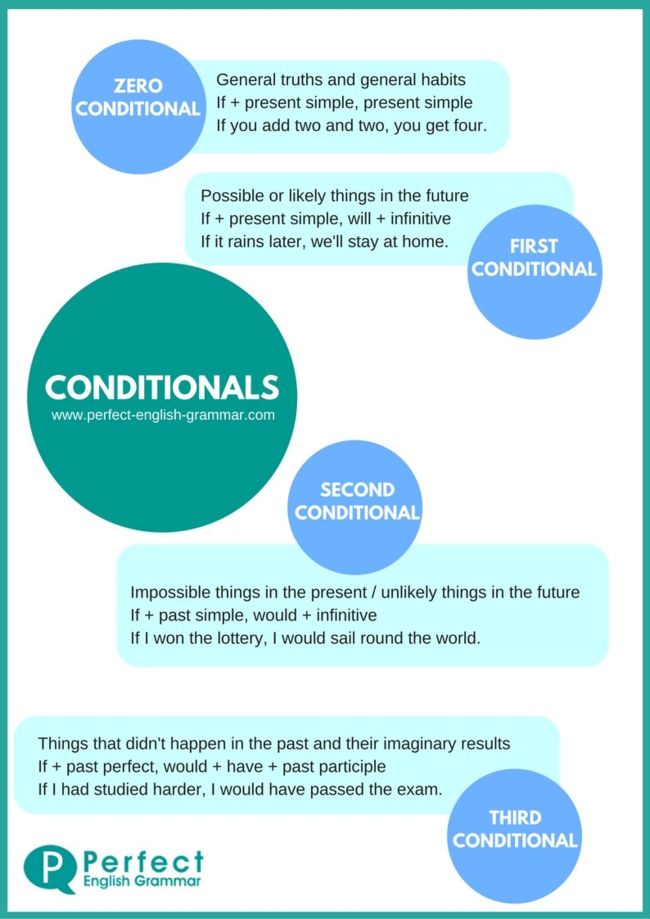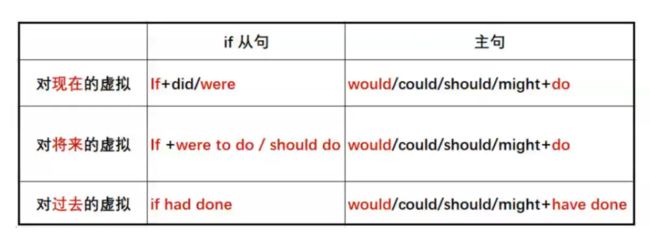Conditionals
What are conditionals in English grammar? Sometimes we call them 'if clauses'. They describe the result of something that might happen (in the present or future) or might have happened but didn't (in the past) . They are made using different English verb tenses.
There are four main kinds of conditionals:
The Zero Conditional:
(if + present simple, ... present simple)
If you heat water to 100 degrees, it boils.
Click here to learn more.
The First Conditional:
(if + present simple, ... will + infinitive)
If it rains tomorrow, we'll go to the cinema.
Click here to learn more.
The Second Conditional:
(if + past simple, ... would + infinitive)
If I had a lot of money, I would travel around the world.
Click here to learn more.
The Third Conditional
(if + past perfect, ... would + have + past participle)
If I had gone to bed early, I would have caught the train.
Click here to learn more.
(Notice we can put 'if' at the beginning, or in the middle. It doesn't matter at all.)
Subjunctive Mood
What is the Subjunctive Mood?
English has three moods. The indicative mood is for stating facts and opinions like "That cat is fabulous." The imperative mood is for giving orders and instructions (usually with an understood subject, you), as in "Look at that fabulous cat." The subjunctive mood is for expressing wishes, proposals, suggestions, or imagined situations, as in "I wish I could look at that fabulous cat all day."
What Does the Subjunctive Mood Look Like?
As we said above, grammatical moods are about verbs. A subjunctive verb usually appears in a sentence with two clauses: in one clause there's the subjunctive verb, and in the other is an indicative verb. (Reminder: a clause is a group of words that forms a part of a sentence and has its own subject and verb.) For example, in "They suggested that I visit that fabulous cat," "they suggested" is in the indicative mood with suggest as an indicative verb, while "that I visit that fabulous cat" is in the subjunctive with visit as a subjunctive verb. "That I visit that fabulous cat" is a proposal being made with the stated assertion of "they suggested." Suggest is one of a number of verbs that frequently play indicative partner to another verb's subjunctive use. Others include ask, demand, recommend, require, insist, urge, and wish.
The subjunctive is so grammatically unobtrusive as to be hard to notice: in most verbs it calls for a lack of inflection, so it's only noticeable in a context that otherwise calls for inflection. For example, the verb visit in the indicative "I visit that fabulous cat" has the same form as in the subjunctive "They suggested that I visit that fabulous cat." But if we replace I with she, the subjunctive form of the verb visit is noticeably different: in the indicative we have "She visits that fabulous cat"; in the subjunctive it's "They suggested that she visit that fabulous cat."
The Subjunctive Mood with "Be" and "Were"
The subjunctive is most noticeable with the common but grammatically complicated verb be. In the present subjunctive, be staunchly remains be instead of changing to am, are, or is according to its subject. And the past subjunctive form of be is consistently were, even when was would otherwise be the form. A note is necessary here, though, about the terms present subjunctive and past subjunctive: the present subjunctive in truth refers mostly to the future ("I request that the fabulous cat be available during my visit"), while the past subjunctive can refer to the present or the past ("I wish that the fabulous cat were more cooperative"). They have the name they do only because the subjunctive forms look like ordinary past and present forms.
There are two uses for the subjunctive that don't draw much attention. The first is in a number of set phrases that tend to be pretty formal sounding: so be it, be that as it may, come what may, suffice it to say, Heaven forbid, and others. These exist a bit like fossils in the language, always in the same form. The other uncontroversial use is in sentences like the formal and often performative "I demand that the fabulous cat be compelled to present himself during my visit." We see that use following such verbs as ask, demand, propose, suggest, and recommend, and after such phrases as it is advisable and it is necessary.
In English, the subjunctive is syntactic rather than inflectional, since there is no specifically subjunctive verb form. Rather, subjunctive clauses recruit the bare form of the verb which is also used in a variety of other constructions.
The English subjunctive is realized as a finite but tenseless clause. Subjunctive clauses use a bare or plain verb form, which lacks any overt inflectional marking.
英语的虚拟从句是一个没有时态的。不需要根据主语进行变化的呆板时态。
eg。
現在式指定語氣
I own, you own, he owns, we own, they own
現在式假設語氣
(that) I own, (that) you own, (that) he own, (that) we own, (that) they own
當使用動詞或助動詞「be」時就能明顯分辨兩種語氣:
現在式指定語氣
I am, you are, he is, we are, they are
現在式假設語氣
(that) I be, (that) you be, (that) he be, (that) we be, (that) they be
「Beware」(注意)是一個不完全動詞並且不存在指示形態,它只有一個現在假設形態:「(that) I beware…」。
當以「not」陳述否定句時,假設語氣不像指定語氣要求前置助動詞:
現在式指定語氣
I do not own, you do not own, he does not own…; I am not…
現在式假設語氣
(that) I not own, (that) you not own, (that) he not own…; (that) I not be…
過去假設語氣僅為動詞「be」而存在,並且不論第幾身主語總是變格成「were」使用:
過去式指定語氣
I was, you were, he was, we were, they were
過去式假設語氣
(that) I were, (that) you were, (that) he were, (that) we were, (that) they were
過去式假設語氣陳述否定句時只須在「were」後面接「not」如「(that) I were not」,「be」以外的動詞在英語中不存在過去式假設語氣。
一些假設句(特別是「were」)可以透過倒裝句式辨認。
来源:
https://www.perfect-english-grammar.com/conditionals.html
https://www.merriam-webster.com/words-at-play/getting-in-the-subjunctive-mood
https://en.wikipedia.org/wiki/English_subjunctive
https://www.hjenglish.com/yufadaquan/p1144496/
https://www.jianshu.com/p/4c0b23f8f22c
https://www.jianshu.com/p/ecf3d45e9c55

